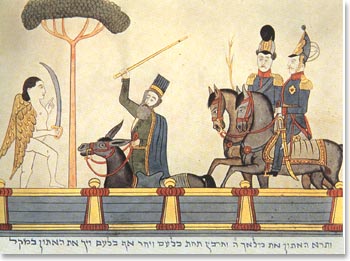|
Bil'am is the epitome of topsy-turvy.
He talks to his donkey, and his donkey talks back. He himself can't see the
world as it is (he is blind in one eye) but his donkey can. The King of Moav
looks to curse Israel, and is cursed in their place. And the curse intended
for Israel is turned into a blessing. Just like the Purim story.
 |
|
Bil'am's ass, Ukraine, second half of 19th
century
|
|
In the story related in the book of Numbers
[1], Balak, King of Moav, engages the renowned pagan soothsayer Bil'am to curse
the Israelites in order to impede their further progress. Bil'am consents only
when he receives the Lord's permission and, further, warns Balak that he will
speak only as the Lord directs him. God thwarts the design altogether, causing
him to bless Israel instead of cursing them.
Told in prose and poetry with much charm and humor, the story, when it opens,
seems to promise a clear and dramatic encounter between the would-be cursers
and Israel. The topsy-turvy quality of the story becomes evident when the divine
messenger who appears is seen only by Bil'am's ass; it is reinforced when the
animal speaks suddenly to its master wryly and sarcastically. When Bil'am arrives
at the king's court, the stage is set for a still more surprising conflict.
Bil'am delivers four prophecies in place of the curses desired and expected
by Balak. In the first two he proclaims that he is speaking in the name of God;
both times Balak fails to grasp that his intention has been thwarted. Blinded
by his preconceptions, he thinks that mechanical preparations for the oracles
are simply incomplete and that, if proper arrangements are made, the desired
curses will be pronounced.
Bil'am's oracles, put into his mouth as a direct divine inspiration, are cast
in poetic form. They sing of Israel, its place among the nations, and its relationship
to God. In the first oracle Bil'am speaks of Israel's nature, of its protection
from curse and foe; in the second oracle, of God's unalterable promise to Israel
and His continuing presence in its midst. When challenged a third time to curse,
Bil'am sings of the beauty of Israel's habitation and predicts that Israel will
be victorious over its enemies. Before he returns to his home, he prophesies
once again: first legitimizing his own special connection with the Almighty
and then predicting the downfall of Moav as well as that of some neighboring
nations. Thus the circle closes: Balak seeks to curse and is cursed in turn.
If this story weren't topsy-turvy enough in the Bible, along come the sages
and given it another, altogether opposite ending. The following is the tale
of Balak and Bil'am, embellished with midrashim and retold over the centuries,
in which Bil'am at last succeeds in cursing Israel.
After the Children of Israel had defeated the giant Og, they
came to Moav and camped there. When Balak, King of Moav, saw their vast numbers
and heard what they had done to Og and his brother Sihon, he was terrified for
his own kingdom.
Read the complete story
as it evolved in the Midrash > >
>
|